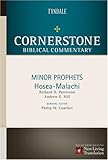
Continuing my series of commentary reviews from Volume 10 of the Cornerstone Biblical Commentary series, here’s one for Malachi. Andrew Hill is also the author of a much more detailed commentary on Malachi in the Anchor Bible series, so this present volume is able to benefit from much his prior work.
Introduction
Malachi writes to a tough audience – they are disillusioned, cynical, callous, dishonest, apathetic, doubting, sceptical, wicked. In their minds, God had failed his people. But he brings a simple message to them “I have always loved you”. Hill provides a very helpful timeline fitting together the post-exilic characters of Zerubbabel, Haggai, Zechariah, Malachi, Esther, Ezra and Nehemiah. Hill’s analysis of the structure of Malachi is that it falls into a series of “disputations”.
Commentary
The format of the CBC series is as follows:
- A section (usually around half a chapter) of Scripture from the New Living Translation (NLT) version
- Some “Notes”, mainly explaining the meaning and background of key words or phrases. There are usually one or two notes per verse.
- A “Commentary” section which seeks to explain the overall message of the section, often with an emphasis on showing how it fits with similar teaching in other books of the Bible. Sometimes it focuses in on a single key concept found in the section, rather than trying to cover everything in the passage.
Each section of commentary concludes with a paragraph or two of application, such as key lessons on marriage from Mal 2:10-16, or how to live in the light of the Lord’s coming on Mal 3:13-4:3. He shows how the concept of “covenant” is important to Malachi (four covenants are mentioned: Abrahamic, Levite, marriage and Mosaic). In the section on Mal 1:6-2:9 he adds his voice to Robert Webber’s appeal that the modern church needs “worship education” – teaching on the history and theology of worship. It would be interesting to read Webber’s "Worship Old and New” to see exactly what his “nine proposals” are.
As with the others in this series, this serves as a helpful Bible study aid for those wanting to go deeper on the minor prophets. It gives you enough information to understand what is going on without getting bogged down in the fine points of exegesis. The commentary section may not always address the questions you might bring to the text, but is a profitable guide for exploring the theological themes raised throughout the book.
